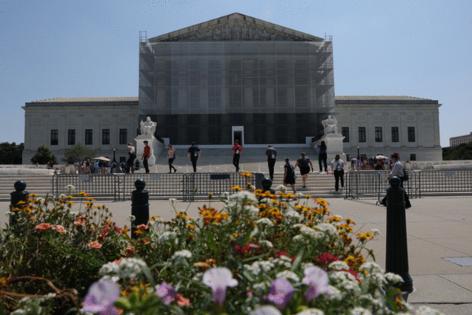Supreme Court will decide GOP-led campaign finance challenge
Published in News & Features
WASHINGTON — The Supreme Court announced Monday it will decide a Republican-led challenge to the limits on how much national political parties can spend in coordination with federal candidates.
The case, brought by the National Republican Senatorial Committee, along with then-Sen. JD Vance, R-Ohio, and former Rep. Steve Chabot, R-Ohio, contends that the campaign spending limits violate the First Amendment to the Constitution.
The court will hold oral arguments in the next term, which starts in October, on whether to overturn a ruling from the U.S. Court of Appeals for the 6th Circuit that upheld the limits first set in the 1970s. A decision would be expected by the conclusion of the term in June.
The Supreme Court also granted a request Monday from the Democratic National Committee and the Democratic Senate and House campaign committees to defend the limits, setting up a partisan clash before the justices that could be a major shakeup for campaign spending.
“A political party exists to get its candidates elected,” the NRSC wrote in its petition in the case. “Yet Congress has severely restricted how much parties can spend on their own campaign advertising if done in cooperation with those very candidates.”
The Trump administration in a filing agreed the limits are likely unconstitutional, which the DNC described as urging the Supreme Court “to blow open the cap on the amount of money that donors can funnel to candidates through party committees’ coordinated expenditures.”
The NRSC in its Supreme Court petition argued that the campaign spending limits are a “severe distortion of the political process.”
The limits were initially meant to prevent the appearance of a quid pro quo by allowing a donor to “launder” funds to support a candidate above the federal contribution limit, but that “Rube Goldberg” method of bribery didn’t make sense particularly because the federal law varies the spending limit by the race and state, the NRSC argued.
“That framework makes no sense if Congress thought that coordinated party expenditures above a certain threshold posed a risk of bribery; no one seriously thinks the purity of politicians tracks state lines,” the petition said.
The Trump administration and Sen. Mitch McConnell, R-Ky., echoed those arguments in their own Supreme Court filings. The Trump administration argued that several court cases undermined the argument that parties should have limits on their spending, which is “core political speech.”
“That restriction on core political speech is not narrowly tailored to serve the only interest that could justify a campaign-finance law, preventing the reality or appearance of quid pro quo corruption,” the Trump administration argued in its brief in the case.
The DNC, which will now defend the law, argued that the campaign spending limits were already upheld by a Supreme Court decision in 2001. The DNC’s brief argued that the limits were necessary to give the law’s individual campaign contribution limits teeth by preventing wealthy donors from going around those limits to earmark larger contributions to political parties.
“There is little practical difference between a contributor giving money to a candidate, on the one hand, and a contributor spending that money in a way that the candidate and the contributor have discussed, on the other,” the DNC brief said.
The coordinated party spending limits started when Congress passed the Federal Election Campaign Act and amended it in 1974. Those limits depend on the office and population of the state where the candidate is running, and the amount increases each year to correspond with inflation, according to the Federal Election Commission.
For most House races the limit is $63,600, but for states with only one representative, the limit is $127,200 in 2025, according to the FEC. Senate race caps also vary by state, from $127,200 for states like Alaska, to $3,946,100 for California according to the FEC.
The NRSC, Vance and Chabot first filed their suit in 2022, arguing the party spending limits unconstitutionally limited their rights to political speech. The group filed a challenge which went directly to the 6th Circuit under a provision of the 1972 law.
In a divided opinion last year, the full 6th Circuit upheld the constitutionality of the law.
The case is the second high-profile political law case on the court’s docket for next term already, as the court has said it will rehear arguments about the constitutionality of Louisiana’s congressional districts in a case that could shape the future of the Voting Rights Act.
The case granted Monday is National Republican Senatorial Committee et al., v. Federal Election Commission et al.
©2025 CQ-Roll Call, Inc., All Rights Reserved. Visit cqrollcall.com. Distributed by Tribune Content Agency, LLC.







Comments